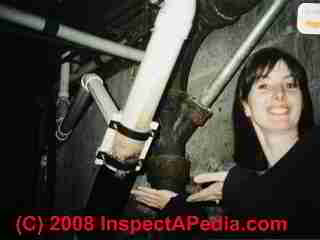 Plumbing Drain Noise Repair Methods
Plumbing Drain Noise Repair Methods
- POST a QUESTION or COMMENT about curing plumbing drain noises in buildings
How to diagnose, track down & fix plumbing drain noise problems.
This article explains how to cure or get rid of annoying plumbing drain noises in buildings. We explain that one first needs to understand the type of drain noises - some indicate plumbing problems to fix. Where drains operate normally but are noisy, we discuss adding sound deadening insulation.
That "blub blub" or "glug glug" noise you hear from a building drain might mean that there is a problem with the drain system itself, such as a partial drain blockage, a drain venting problem, a drain odor problem, or even a failing septic system.
This article explains the cures for plumbing drain noises, and we refer to key companion articles that assist in that diagnosis.
InspectAPedia tolerates no conflicts of interest. We have no relationship with advertisers, products, or services discussed at this website.
- Daniel Friedman, Publisher/Editor/Author - See WHO ARE WE?
How to repair problems causing plumbing drain sounds
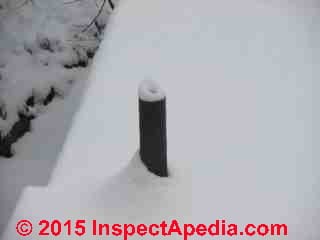 Just a bit of snow sitting atop the plumbing vent that extends above the snow level on the roof (photo at left) is probably not a problem - heat from escaping vent gases should melt through a bit of snow.
Just a bit of snow sitting atop the plumbing vent that extends above the snow level on the roof (photo at left) is probably not a problem - heat from escaping vent gases should melt through a bit of snow.
But as we illustrate and explain below, in very cold weather moisture can freeze inside and block the plumbing vent above the roof line - just one of many possible sources of blocked plumbing vents and plumbing drain noises.
This article is about curing plumbing drain noises. If you need to figure out where a plumbing drain noise is originating, see this companion article: PLUMBING DRAIN NOISE DIAGNOSIS
Article Contents
- PLUMBING DRAIN NOISE REPAIR
- 2 TYPES of PLUMBING SYSTEM NOISES
- STOP PLUMBING NOISE by ADDING MISSING VENTS
- STOP PLUMBING NOISE by ADDING SOUND INSULATION
- STOP GURGLING DRAINS
- FROST / SNOW BLOCKED PLUMBING VENTS CAUSE GURGLING
- STOP PLUMBING NOISE by CLEARING SLOW or BLOCKED DRAINS
- ODORS due to CLOGGED PLUMBING VENTS or SEWER or SEPTIC SYSTEMS
2 Types of Plumbing System Noise Sources
First, it is helpful to divide cures for plumbing drain, waste, vent piping sounds and plumbing fixture sounds into two groups, because the actions we will take are distinctly different in each.
- Plumbing defect noises associated with plumbing system problems or defects whose identification and diagnosis is discussed on this page and
also more-comprehensively
at PLUMBING DRAIN NOISE DIAGNOSIS
Our complete list of various plumbing system noises is
at PLUMBING NOISE CHECKLI ST - Plumbing drain/waste/vent noises that occur normally during plumbing operation, such as the sound of wastewater rushing through a copper main building drain, perhaps overhead in a basement family room, are cured by adding insulation in strategic locations or where cost-justified, by changing the type of plumbing materials (copper changed to cast-iron or example).
Information about controlling plumbing noises in buildings by isolating sounds, stopping noise transmission, or adding sound insulation is
at SOUND CONTROL for PLUMBING
At NOISE, PLUMBING DRAIN DIAGNOSIS we include a question and answer case (with photos) discussing loud plumbing drain noises in a home along with our recommendations.
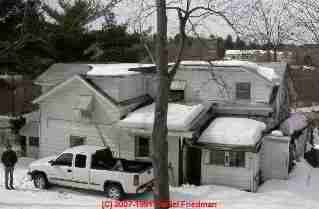 How to Stop Plumbing Noises by Adding Missing plumbing vents
How to Stop Plumbing Noises by Adding Missing plumbing vents
Add missing plumbing vents to stop gurgling & slow drains
The photo shows a large house with only one plumbing vent visible (click the image for a
larger view).
We didn't see vents over or anywhere near the portion of the home which
houses a kitchen and bath.
While it might be possible for the building to have a working
vent system, the combination of its age and other details raised a question worth
investigating further.
If we find that there are other "short" plumbing vents which
were covered by the deep snow in this photo, they need to be extended.
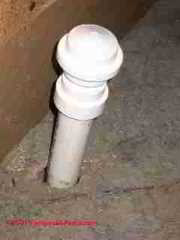
When plumbing vents are simply not provided, the proper repair is to install missing vent piping, up through
the building and through its roof. In old buildings you may see vertical plumbing lines that were
added, in plain view, inside the living space. But modern construction "hides" these pipes in
the building walls.
If you want to install modern, hidden plumbing vents, and providing your
plumber has shown you that in fact they're missing, you may want to wait until other more extensive
interior remodeling are in the works.
Install vacuum breaker plumbing vents (e.g. V-200™) where routing a new vent line is troublesome
Meanwhile the plumber may install an illegal vacuum breaker to improve drainage - these products can be added wherever a drain is having trouble getting enough air to flow properly, but in most jurisdictions their use is subject to approval by the local plumbing inspector.
At PLUMBING DRAIN VENTS we explain the basics of proper plumbing vent piping and how plumbing vent piping errors cause trap siphonage, odors, and noises.
Stop Plumbing Drain Noises by Adding Sound Insulation
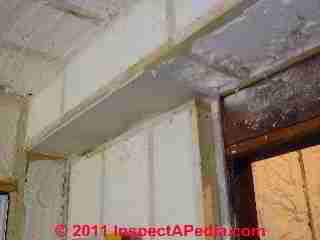 at NOISE, PLUMBING DRAIN DIAGNOSIS we include a question and answer case (with photos) discussing loud plumbing drain noises in a home along with our recommendations. Excerpts are below:
at NOISE, PLUMBING DRAIN DIAGNOSIS we include a question and answer case (with photos) discussing loud plumbing drain noises in a home along with our recommendations. Excerpts are below:
The level of plumbing drain noise transmitted into a space where you actually hear it in the building depends on these factors:
- the acoustic transmission properties of the thinner walled plastic piping,
- the proximity of the piping to occupied space,
- the absence of noise insulation around the pipes, and
- details of exactly how the pipe was routed and supported. Specifically, pipes that are in solid contact with building framing or drywall transmit more noise. Pipes that were suspended using acoustic-isolating hangers transmit less noise to the building interior.
As we cite at PLUMBING NOISE CHECKLIST,- According to the Canadian CNRC, "Noise reductions up to about 15 dBA can be obtained relative to systems where no resilient mounts are used for pipes."
What to do now to reduce drain pipe noise?
In new construction we can avoid noisy drains by using sound-isolating pipe hangers, attention to pipe routing details to keep pipes from having solid contact on ceiling joists and wall studs, and by providing insulation around the piping between ceiling joists, floor joists, or wall studs.
But in an existing building it would be costly and probably unnecessary to tear out ceilings and walls to correct these details. Instead we add pumped-in or blown-in foam insulation into the areas where these pipes are routed.
You could use blown-in cellulose or fiberglass but it's a bit more difficult to assure that those insulating materials will flow around the pipes in the building cavity. Instead we recommend filling the ceiling joist or wall stud bay where the pipe is contained - fill it completely, a step that significantly reduces noise transmission.
Our photo shows what the ceiling pipe chase (and surrounding areas) looked like after a professional blown-in foam insulation job in the same New York home. Subsequently of course drywall was installed over these surfaces (we do not leave foam insulation exposed because of fire hazards).
After this foam was installed there was no plumbing noise detected in this area when the toilet was flushed in the floor above.
As it expands, foam insulation will flow around the piping into odd-shaped spaces and will fill the pipe chase spaces completely. The "blown in" foam insulation won't have to fill an entire wall or ceiling space, just the space where the pipes actually run.
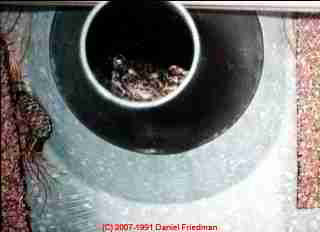 But because the volume of these spaces is more than you can fill economically using little spray cans of foam, we recommend hiring a foam insulation contractor to do this job. The foam installer should not have to tear off drywall to do this job.
But because the volume of these spaces is more than you can fill economically using little spray cans of foam, we recommend hiring a foam insulation contractor to do this job. The foam installer should not have to tear off drywall to do this job.
Typically the contractor will fill the appropriate pipe routing cavities by injecting insulating foam through very small openings spaced along the route of the piping. The result will be no more than occasional 1/2" diameter or less holes to patch and paint.
Stop Gurgling Drains by Clearing Blocked Plumbing Vents
A plumbing drain line could itself blocked, as opposed to a blocked or inadequate plumbing vent line. In the case of a partially blocked plumbing drain, case all of the fixtures served by that drain line will always be slow to drain.
When weather and safe access permit going onto a roof (or using the services of a professional for that purpose), check for blocked building plumbing vents such as plumbing vents that may have become blocked by an insect nest, birds nest, or as shown in this photo, a frog.
In freezing climates, check in winter to be sure that the plumbing vents are not being
blocked by frost or by snow-cover.
See COLD WEATHER SEWER or SEPTIC ODORS
How to repair frost-blocked or snow-covered plumbing vents
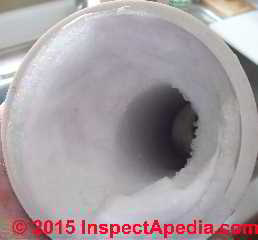
- Fixing a freezing plumbing vent line in which the plumbing vent becomes partially or fully blocked by
frost or ice where it extends above the roof in a freezing climate, probably requires the
installation of a larger diameter vent from the attic out through the roof.
This photo of a frost-clogged plumbing vent (left) was provided by an InspectApedia reader.
First check for leaks: before installing a larger diameter plumbing vent line, make sure that there is not
a hot water leak into the plumbing drains or continuous shower use.
A
water leak into the drain system can result in
continuous movement of water vapor or "steam" upwards in the vent system too.
In freezing weather that water vapor may condense and then freeze in the outdoor portion of the plumbing vent system simply because it's passing that way continuously.
Too-short plumbing vent stacks
A plumbing vent stack which is too short above the building roof can be blocked by snow and then stop venting.
But that does not mean that we should be installing
very tall (3' to 6') plumbing vents.
Except in areas of unusual snow depth
such heights are probably much higher than needed.
The plumbing vent stack above a roof needs to be high enough to never be covered by snow, not more.
We speculate (really am guessing) that perhaps if a vent is TOO tall in a cold climate, moist air never will escape
at its top because the added cold length of pipe actually encourages freezing.
Stop Plumbing Noise by Curing Sluggish or Blocked Plumbing Drains
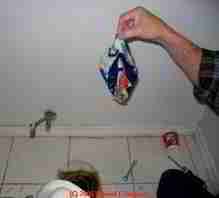 Often slow or noisy plumbing drains are traced to a partial blockage such as the problem caused when our grandson Chase flushed his underpants down the toilet. We discuss this event and its diagnosis and repair
Often slow or noisy plumbing drains are traced to a partial blockage such as the problem caused when our grandson Chase flushed his underpants down the toilet. We discuss this event and its diagnosis and repair
at TOILET CLOG REPAIR, UN-BLOCK. But first you should read the text below.
Also see SEPTIC BACKUP PREVENTION (private septic systems)
SEWER BACKUP PREVENTION (buildings connected to municipal sewers) and also see the health and safety concerns discussed
at SEWER GAS ODORS.
Gurgling drains may indicate a partially blocked drain line or sluggish septic system
If the outside sewer line is partially blocked, or if waste piping to a septic tank or from a septic tank to a drainfield is partially blocked, the building drains may appear to work normally until there is a surge of usage such as an increase in occupants or when using a washing machine.
In lighter usage the waste and wastewater flow down into the main drain line or sewer line where they are in effect, "stored" while the waste slowly seeps past the partial blockage.
As wastewater seeps past the partial main drain blockage a gurgling sound may be produced at fixtures in the building as air is drawn intermittently into the drains - an effect more pronounced if the building drain vent system is inadequate.
In heavier usage of building fixtures, such as when there are many occupants or when doing laundry, the additional volume of water may first cause this "gurgling drain" symptom to be more pronounced, and as the blockage worsens, the building drains may actually back up during heavy use. This condition can also produce sewage smells or sewer gas backups into a building.
See CLOGGED DRAIN DIAGNOSIS & REPAIR
Odors due to clogged plumbing vents, drains, or blocked, failing septic systems
Clogged, partly clogged, slow drains or a partly-blocked, failing drainfield can also cause odors when the surge of water from the washer causes a gas backup in the system:
and ODORS, SULPHUR SMELL SOURCES
...
Reader Comments, Questions & Answers About The Article Above
Below you will find questions and answers previously posted on this page at its page bottom reader comment box.
Reader Q&A - also see RECOMMENDED ARTICLES & FAQs
Question: bathub sounds when toilet is flushed
(Oct 22, 2012) stan said:
when flushing the toilet the bathtub makes some sounds?
Reply:
Look for a clogged or partly clogged drain or vent line.
Question: gurgling sink when dishwasher runs
(Mar 5, 2013) rob k said:
When running dishwasher, kitchen sink and bathroom sink gurgle, (both on same floor). any suggestions? Thankyou in advance, rob.
Reply:
Probably there is a shared drain and trap with the dishwasher - this noise may be normal.
Question: noisy drip sound in bathroom drain
(Mar 14, 2015) Karl said:
I have a problem with a dripping noise in the bathroom drain, when the cold water is running and draining out there is no noise, when the hot water drains the is a dripping noise, is it possible that it's just the expansion of the drain pipe rubbing against the studs? Thanks
Reply:
Karl
Kudos for thinking up a possibility I've never considered. I don't think thermal expansion would make a dripping noise, more likely a squeak.
But a very small defect might leak under thermal expansion.
Question: banging pipes while toilet fills
(Mar 21, 2015) NEIL said:
I hear a banging noise when the toilet is filling after a flush.
Reply:
Neil
at CONTINUE READING you'll find an ARTICLE INDEX where you can then find see WATER HEATER NOISE DIAGNOSIS, CURE
...
Continue reading at PLUMBING DRAIN NOISE DIAGNOSIS or select a topic from the closely-related articles below, or see the complete ARTICLE INDEX.
Or see these
Recommended Articles
- BLOCKED DRAIN REPAIR METHODS
- CLOGGED DRAIN DIAGNOSIS & REPAIR - home
- DRAIN & SEWER PIPING - home
- PLUMBING NOISE CHECKLIST
- PLUMBING SYSTEM NOISE DIAGNOSIS & CURE - home
- BANGING HEATING PIPES RADIATORS
- CLOGGED DRAIN DIAGNOSIS & REPAIR
- DRIPPING WATER SOUND Sources
- PLUMBING DRAIN NOISE DIAGNOSIS
- PLUMBING DRAIN NOISE REPAIR
- PLUMBING NOISE TRANSMISSION CONTROL
- PLUMBING SUPPLY PIPE NOISE
- PLUMBING VENT CODES, DEFINITIONS, TYPES
- PLUMBING VENT DEFECTS & NOISES
- PLUMBING VENT NOISE
- PLUMBING VENT ODORS
- PLUMBING VENT REPAIR
- SOUND CONTROL for PLUMBING
- WASHING MACHINE NOISE CAUSE & CURE
- WATER HAMMER NOISE DIAGNOSE & CURE
- WATER HEATER NOISE DIAGNOSIS, CURE
- WATER PUMP NOISE DIAGNOSIS
- WATER SUPPLY PIPE WHISTLE NOISE
- WATER TANK NOISE DIAGNOSIS
- PLUMBING VENT DEFECTS & NOISES
- PLUMBING VENT PIPING
Suggested citation for this web page
PLUMBING DRAIN NOISE REPAIR at InspectApedia.com - online encyclopedia of building & environmental inspection, testing, diagnosis, repair, & problem prevention advice.
Or see this
INDEX to RELATED ARTICLES: ARTICLE I NDEX to BUILDING NOISE DIAGNOSIS
Or use the SEARCH BOX found below to Ask a Question or Search InspectApedia
INDEX to RELATED ARTICLES: ARTICLE I NDEX to PLUMBING SYSTEMS
Or use the SEARCH BOX found below to Ask a Question or Search InspectApedia
Ask a Question or Search InspectApedia
Try the search box just below, or if you prefer, post a question or comment in the Comments box below and we will respond promptly.
Search the InspectApedia website
Note: appearance of your Comment below may be delayed: if your comment contains an image, photograph, web link, or text that looks to the software as if it might be a web link, your posting will appear after it has been approved by a moderator. Apologies for the delay.
Only one image can be added per comment but you can post as many comments, and therefore images, as you like.
You will not receive a notification when a response to your question has been posted.
Please bookmark this page to make it easy for you to check back for our response.
IF above you see "Comment Form is loading comments..." then COMMENT BOX - countable.ca / bawkbox.com IS NOT WORKING.
In any case you are welcome to send an email directly to us at InspectApedia.com at editor@inspectApedia.com
We'll reply to you directly. Please help us help you by noting, in your email, the URL of the InspectApedia page where you wanted to comment.
Citations & References
In addition to any citations in the article above, a full list is available on request.
- DEVELOPMENTS in NOISE CONTROL [PDF] NRCC, National Research Council, Canada, suggestions for noise control, sound transmission through block walls, plumbing noise control, noise leaks, and sound control advice. Web search 01/17/2011, original source: www.nrc-cnrc.gc.ca/eng/ibp/irc/bsi/90-noise-control.html
- Our recommended books about building & mechanical systems design, inspection, problem diagnosis, and repair, and about indoor environment and IAQ testing, diagnosis, and cleanup are at the InspectAPedia Bookstore. Also see our Book Reviews - InspectAPedia.
- In addition to citations & references found in this article, see the research citations given at the end of the related articles found at our suggested
CONTINUE READING or RECOMMENDED ARTICLES.
- Carson, Dunlop & Associates Ltd., 120 Carlton Street Suite 407, Toronto ON M5A 4K2. Tel: (416) 964-9415 1-800-268-7070 Email: info@carsondunlop.com. Alan Carson is a past president of ASHI, the American Society of Home Inspectors.
Thanks to Alan Carson and Bob Dunlop, for permission for InspectAPedia to use text excerpts from The HOME REFERENCE BOOK - the Encyclopedia of Homes and to use illustrations from The ILLUSTRATED HOME .
Carson Dunlop Associates provides extensive home inspection education and report writing material. In gratitude we provide links to tsome Carson Dunlop Associates products and services.

